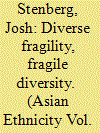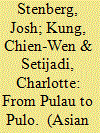|
|
|
Sort Order |
|
|
|
Items / Page
|
|
|
|
|
|
|
| Srl | Item |
| 1 |
ID:
191778


|
|
|
|
|
| Summary/Abstract |
Attending to postwar Chinese-language letters in Indonesia and the Philippines reveals a stronger tendency to write within a discourse of long-distance cultural nationalism than in hybrid or local modes. Omitting cultural nationalist discourses from a view of the corpus risks skewing accounts of Sinophone production, since many authors who write in Chinese have been receptive to ethnic, cultural, and even political appeals from China. This result is also ironic, in that it is specifically production in Chinese (rather than in imperial or archipelagic languages) which is most in tension with the postmodern and postcolonial bent of the Sinophone turn. As an open system for interrogating essentialist definitions of ‘Chineseness’, Sinophone Studies should also accommodate the culturally (and sometimes politically) orthodox ‘Chinese’ strands of Southeast Asian writing. Considering non- or less-hybrid strands of the corpus in turn opens new avenues for understanding the region’s Sinophone cultural production as the result of a rich, politically diverse network with considerable scope for comparative intraregional study.
|
|
|
|
|
|
|
|
|
|
|
|
|
|
|
|
| 2 |
ID:
191774


|
|
|
|
|
| Summary/Abstract |
Southeast Asia is an important region for working through questions of Chineseness. It is, however, a notoriously heterogeneous region, and conclusions derived from some parts of it can be of limited applicability elsewhere. This special issue offering empirically-grounded, multi-disciplinary research engages with and expands on existing scholarship on Southeast Asia’s Chinese. By focusing on Indonesia and the Philippines, the articles in this special issue investigate diverse models of being Chinese in Southeast Asia and depart from the familiar paradigms offered by Singapore and Malaysia, where ethnic Chinese populations are in the highest proportions and hold significant political power, and where Anglophone institutions transmute formulations of Chineseness into academic and political discourse. In so doing, we call for recognising diversity within Chinese communities in the region, not only among localised, hybrid expressions of Chineseness, but in the coexistence of both hybridity and persistent identification with Chineseness in multiple forms.
|
|
|
|
|
|
|
|
|
|
|
|
|
|
|
|
| 3 |
ID:
129806


|
|
|
|
|
| Publication |
2014.
|
| Summary/Abstract |
Before the 21st century, Chinese presence in Libya was minimal. In the last years of the Gaddafi regime, however, a large-scale temporary migrant community quickly formed. Then, as unrest in Libya increased, the community was withdrawn abruptly in early 2011 in China's first officially organized mass evacuation. This short-lived community does not display the characteristics associated with Chinese migration to Africa as a whole, suggesting the necessity of local ethnographic case studies across the continent to form a more accurate and complete picture. Migration was spurred by labour contracted by state-owned enterprises (SOEs) from all over China, and did not feature private traders except for those who provided services for the labourers. It is probable that any recurrence of Chinese migration into Libya will again be SOE-driven, although favourable attitudes and policies on the part of the post-Gaddafi administration could possibly engender a more autonomous minority.
|
|
|
|
|
|
|
|
|
|
|
|
|
|
|
|
| 4 |
ID:
142502


|
|
|
|
|
| Summary/Abstract |
This article examines wayang potehi, a cloth glove puppet theatre of southern Fujian origin performed on Java. It outlines the genre's emergence in Fujian, its arrival in the archipelago, and historical and contemporary practice. This article seeks to respect potehi's Hokkien roots, Indonesian practice, and the place of its genre in a dynamic regional history as it traces the development, practice and uses of the genre. Contemporary potehi patronage often exhibits the strategies of the mixed-culture non-Chinese-speaking communities of East and Central Java to perform a streamlined, integrationist, and loyal Sino-Indonesian identity.
|
|
|
|
|
|
|
|
|
|
|
|
|
|
|
|
|
|
|
|
|